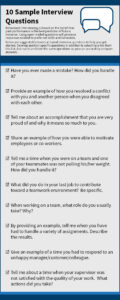The answer seems simple, right? You’d think that hiring happy people makes for a happy, positive workplace. Or, do happy workplaces create happy employees? Well, there’s conflicting research on this and it’s a bit like the chicken and the egg scenario. So, without delving too deeply into the debate, it’s safe to say two things:
- Happiness isn’t everything. It can even be counterproductive to your work environment. A University of Pennsylvania study found that happy people are perceived as naïve or ignorant of services and products. Rather than seeking seemingly happy candidates, look for applicants with qualities like responsibility, determination, motivation, or grit that align with your company and its values.
- Keep in mind that work environments shape people’s happiness.

Finding the Right Qualities
Someone I know jokingly referred to her interview criteria as how not to hire “crazy” negative people. So, how do you assess a candidate’s motivation and his/her potential for success at your company?
Ask example-heavy questions.
You see, there’s a reason behavioral interviews are so popular: they work. Ask your candidates for past examples that demonstrate specific professional qualities. These questions force your candidates to specify how they handled work situations that may be similar to ones they’ll encounter at your company.
If they answer in a canned or generic way, keep pressing until you get a sense for how they conducted themselves or how they would approach a hypothetical situation.
Creating a Happier Workplace
Even after employers assess a candidate’s fit and issue the offer letter, they’re not off the hook. People spend most of their time at work after all, so it’s no surprise that your organization’s culture impacts your employees’ moods.
A recent survey from Randstad looked at the reasons why employees stayed with or separated from an employer. The researchers found that relationships, respect, career potential, and environment influence why employees leave their jobs. Preventing those issues means fostering a positive workplace culture of inclusive values and attitudes that employees all share.
A Forbes article outlines a few ideas for you and your managers to consider when creating a positive work environment. Find ways to foster relationships between employees, like regular coffee meetings or potlucks. Think about an open door policy, complaint procedures, and inclusive language and visuals that go into employee communications.
Do You Know How Your Employees Feel at Work?
Consider checking in with your employees to get a sense for any work culture issues that may be brewing. To get the ball rolling, identify 1-2 issues you have the bandwidth to address. Just listening to your employees may help improve a negative environment; most people want to feel respected and heard.
Regardless of which came first — happiness or happiness at work — the combination of hiring the right people, with a growth mindset and cultivating a positive corporate culture are the ingredients for company success.
